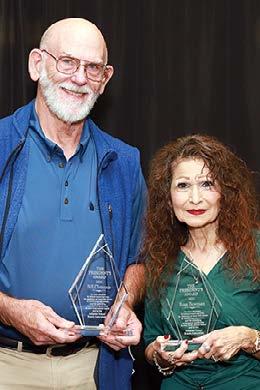
6 minute read
BXS Insurance
from March 2022
by ASBA
White told board members that being a school board member has become more difficult as local officials have been dragged into national political issues. The politics this year will be unavoidable as school board elections coincide with partisan midterm elections. Parents, meanwhile, are becoming more assertive in their children’s educations. White said this year has been even harder than last year for teachers because so many people are emotional.
The most obvious example of this is the topic of mask mandates. School boards have had to respond to changing and conflicting health directives and political and court decisions. A state law passed in 2021 forbade districts from enacting mandates, but it was followed by a court decision that said they could. Bentonville voted to enact a mandate and then was enjoined by another court from doing so.
One school board president said her district decided to let patrons speak about the topic. It wasn’t comfortable, but board members tried to keep order with the help of a timer. Speakers would be called out of order if they mentioned a staff member or board member’s name, and there was a police presence at the meeting.
“I do feel like in the end, and over time, people appreciated the fact that they got to say what they wanted to say,” she said. “Was it very hard on us? Absolutely. Did I feel personally attacked sometimes? Sure. I do feel like it helped our community to try to come to some sort of consensus and acceptance of the decisions that were being made, though, by our school board.”
Ali Noland, a Little Rock School Board member and attorney with a background in First Amendment law, expressed concern about efforts to limit criticism of elected officials. She recalled what it felt like when her district was under state takeover and was under the control of the State Board of Education, which she said often did not allow members of the public to comment during meetings.
“I know how that feels to feel like, well, they don’t even want to hear what we have to say,” she said. “You know, those sorts of things. I’m very much on the side of allowing the comment and even allowing them to be critical of us, even though it’s hard, just because I feel like it’s important for the process.”
White said school districts must do what is right for their community. He said the board is trying to “bring our community’s temperature level down” and make patrons feel heard. Bentonville has a small boardroom, and he has resisted moving meetings to larger venues.
“If you create a stage, people are going to stand on a stage,” he said. “I’m not saying it’s not necessary, and I will tell you we’re still in that discussion. We’re still trying to say, can we take
Continued on next page
A Longtime Protector of Educators’ Professional Reputations
• School board legal liability insurance • Employment practices liability insurance • Outside of Arkansas General Liability coverage • Distinctive and identifiable coverage grants • Modified “defense outside of the limits” provision • Separate crisis management fund • Employment law resources through Enquiron • Online resource website • Panel defense counsel • Dedicated claim representative
For a quote comparison or coverage consultation, contact: Bill Birch | CSRM Senior Vice President (800) 358-7741 | (501) 614-1170 | Bill.Birch@bxsi.com
bxsi.com

PRESIDENT’S AWARD. The President’s Award is earned by school board members who achieve 500 hours of boardsmanship training. Pictured from left are Bill Clements of the Conway School Board, Rosa Bowman of the Ashdown School Board, Randy Goodnight of the Greenbrier School Board, Debbie Ugbade of the Hot Springs School Board, and John Gibson of the South Conway County School Board.
PLATINUM AWARD. The Platinum Award is earned by Arkansas school board members who achieve 400 hours of boardsmanship training. Pictured from left are Kenneth Graves of the DeWitt School Board, Randy Hutchinson of the Springdale School Board, and Carl Frank of the Glen Rose School Board. Not pictured is Napoleon Davis of the Stuttgart School Board.
some air out of the debate – not make one person or one side more right than the other, but can we take some emotion out of the debate by just listening?”
White said it can take a while for a board that has never done public comments to develop a rhythm. Bentonville’s board in the past allowed members of the public to sign up when they arrived at the meeting. With the mask issue, it created a more stringent process where speakers could sign up in advance online. In the initial meeting, both sides were given 25 minutes to speak, with each speaker offered one minute. It’s now two minutes. Time can pass quickly, but he doesn’t give meandering speakers more time. He always gives the same speech beforehand where he thanks those who have come to speak, explains the time limit, says the board cares what they have to say and will listen but not respond, and asks them to be respectful.
El Dorado School Board member Wayne Gibson said his board also had a preregistration process and gave members of the public two minutes each to speak about masks. When several refused to stop, their mikes were cut off.
White said Bentonville voted 5-2 to enact a mask mandate for the fall semester before the court order prevented the district from enforcing it. He was one of the two. He didn’t think it was the right decision for the community at the time. However, as board president he spoke for the decision when asked by members of the media.
He said he tries to be boring when dealing with the media. Reporters are looking for a story, and dissension among board members would be the biggest one coming out of a meeting. That story sends a message to the community that the board is dysfunctional, and to teachers and staff members that the board is unpredictable and unhealthy. He advised staying off social media and being careful when using it. A school board member who talks about school-related subjects on a private Facebook page has created an open public forum and can’t delete comments.
White said boards should take seriously the decision of whether or not to place a topic on the agenda and should consider keeping it off. Including it can demonstrate to the public that the board is having a conversation about the issue, but on the other hand, “Pandora’s box is really hard to get closed up again once it’s open,” he said. He said as president he uses consistent, repetitive language as he moves through the agenda. Doing so allows the board to think about the issue rather than what he’s doing. Board members, meanwhile, should try to get topics placed on the agenda before the meeting rather than surprise the board with an unexpected topic. White said formality is important and will become more so. He predicted there will be challenges to the official ways a board takes an action, such as making a motion.
While mask mandates have been the hottest topics this year, others are sure to come up, including controversial library books and critical race theory.
The latter is challenging because it is vaguely defined and open to interpretation, White said. School board members should try to determine what lesson is making a parent uncomfortable and get the superintendent involved. School board members should understand and explain the rigorous process that leads to the creation of school curriculum. Problems often occur with additional materials assigned by teachers, but parents can be assured a review process exists for potentially inappropriate material. By explaining those processes, a board member can educate parents and give them an outlet.
“Now, they’re going to have likes and dislikes,” he said. “They may agree or disagree with you. But you’ll become a better and more effective communicator, and you’ll understand the message.”
How do board members return to student achievement-centered governance in the midst of all this controversy? They must build back trust with the administration, constituents, teach-











